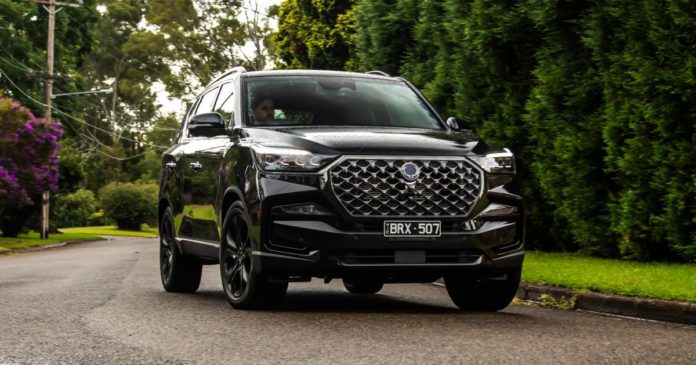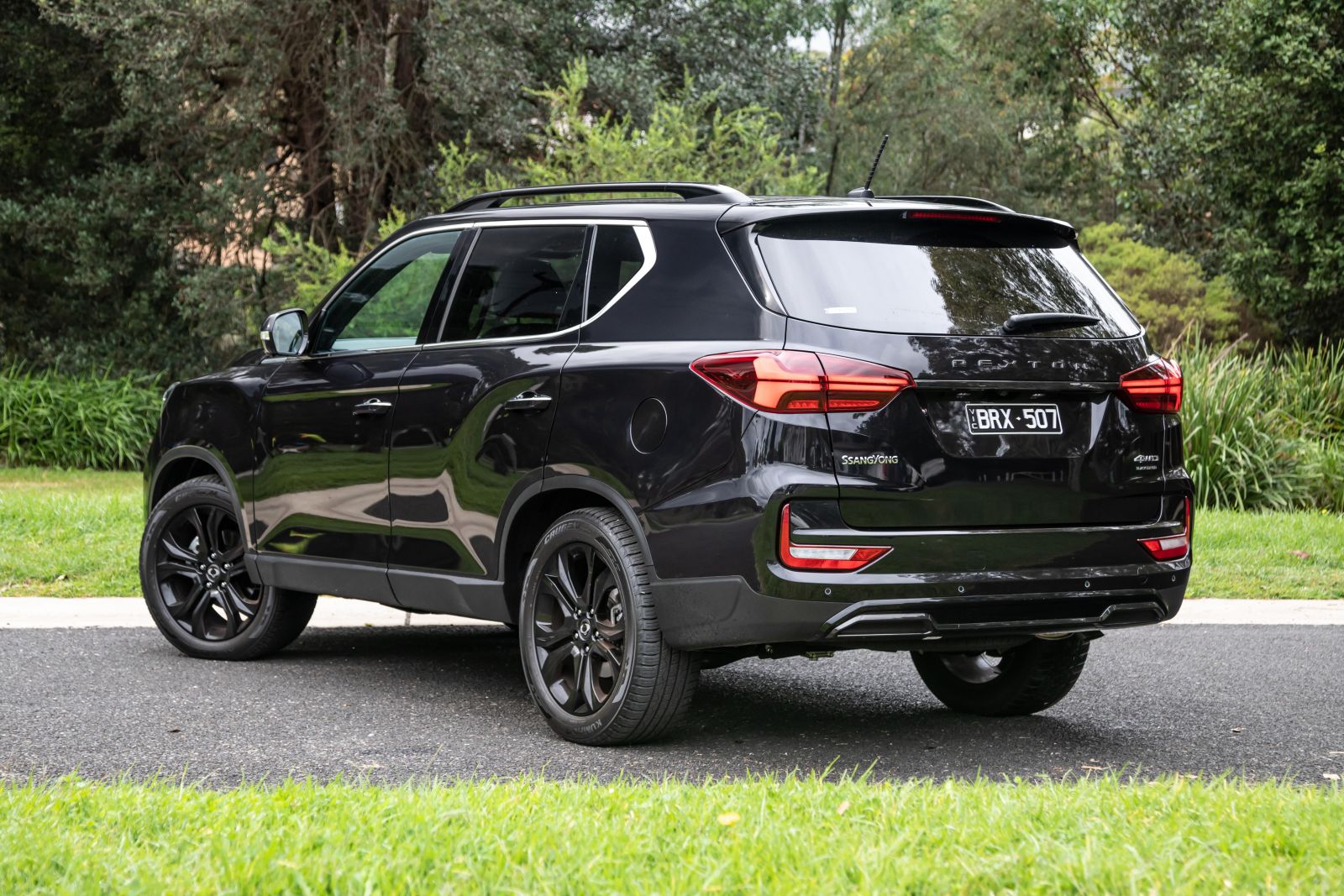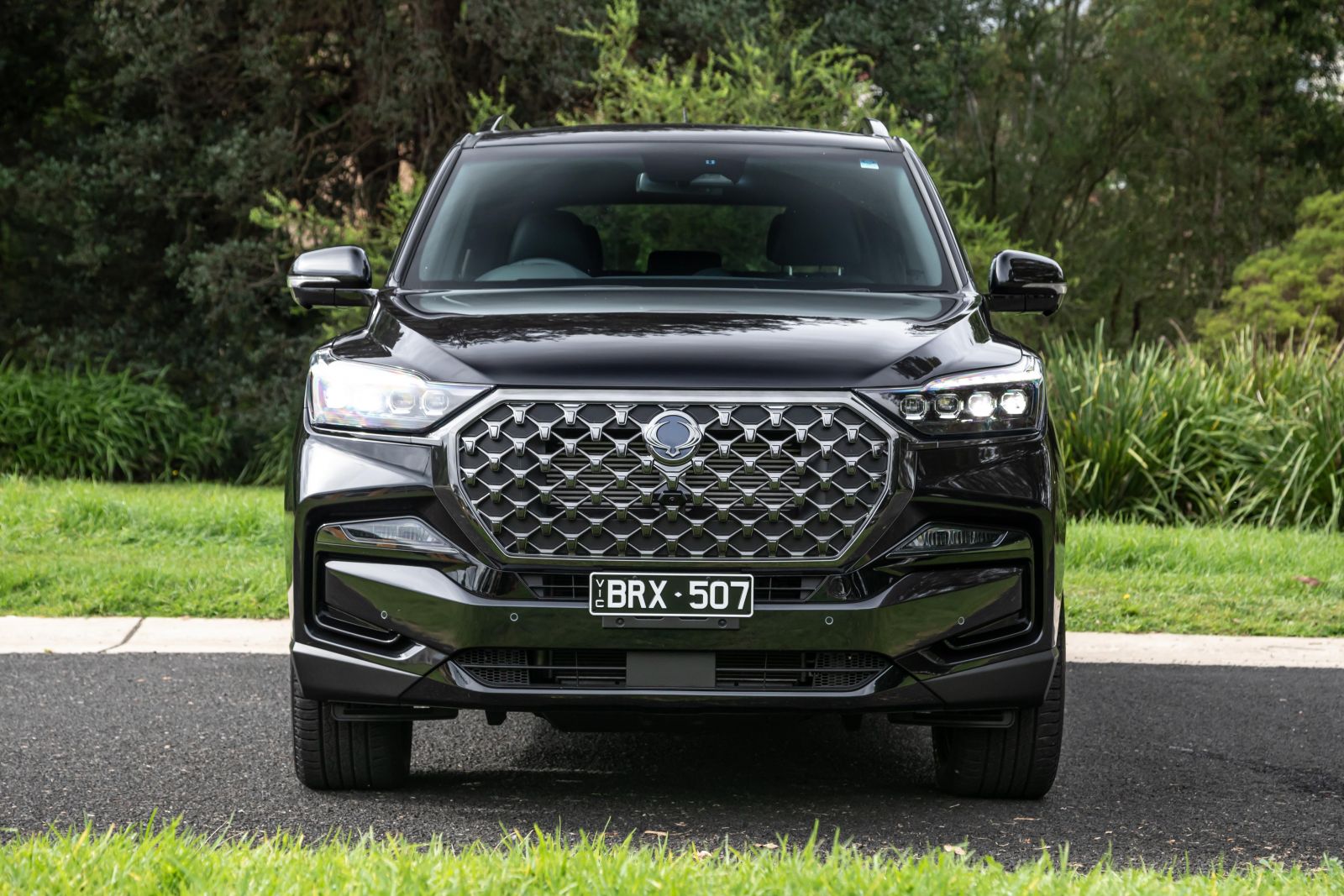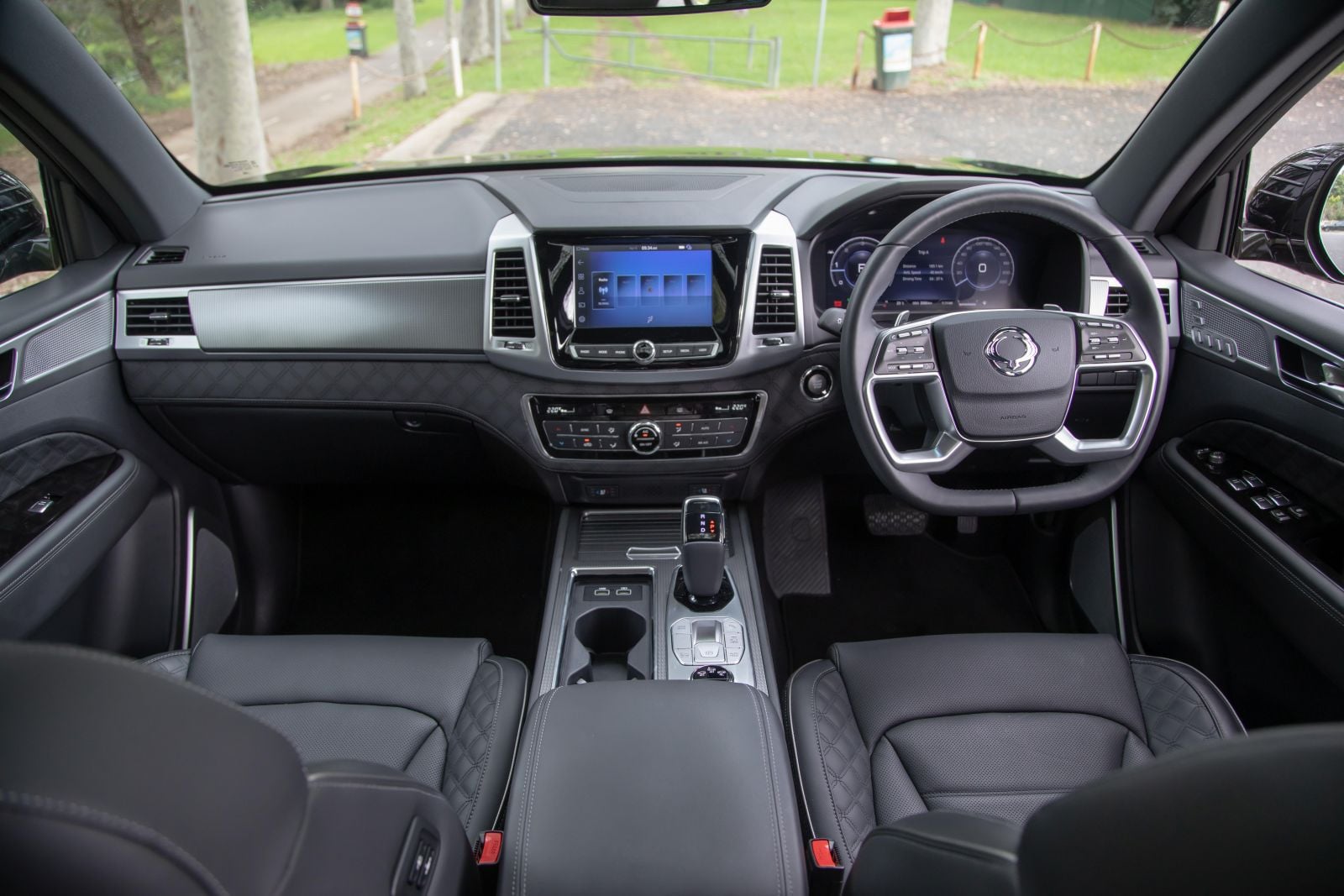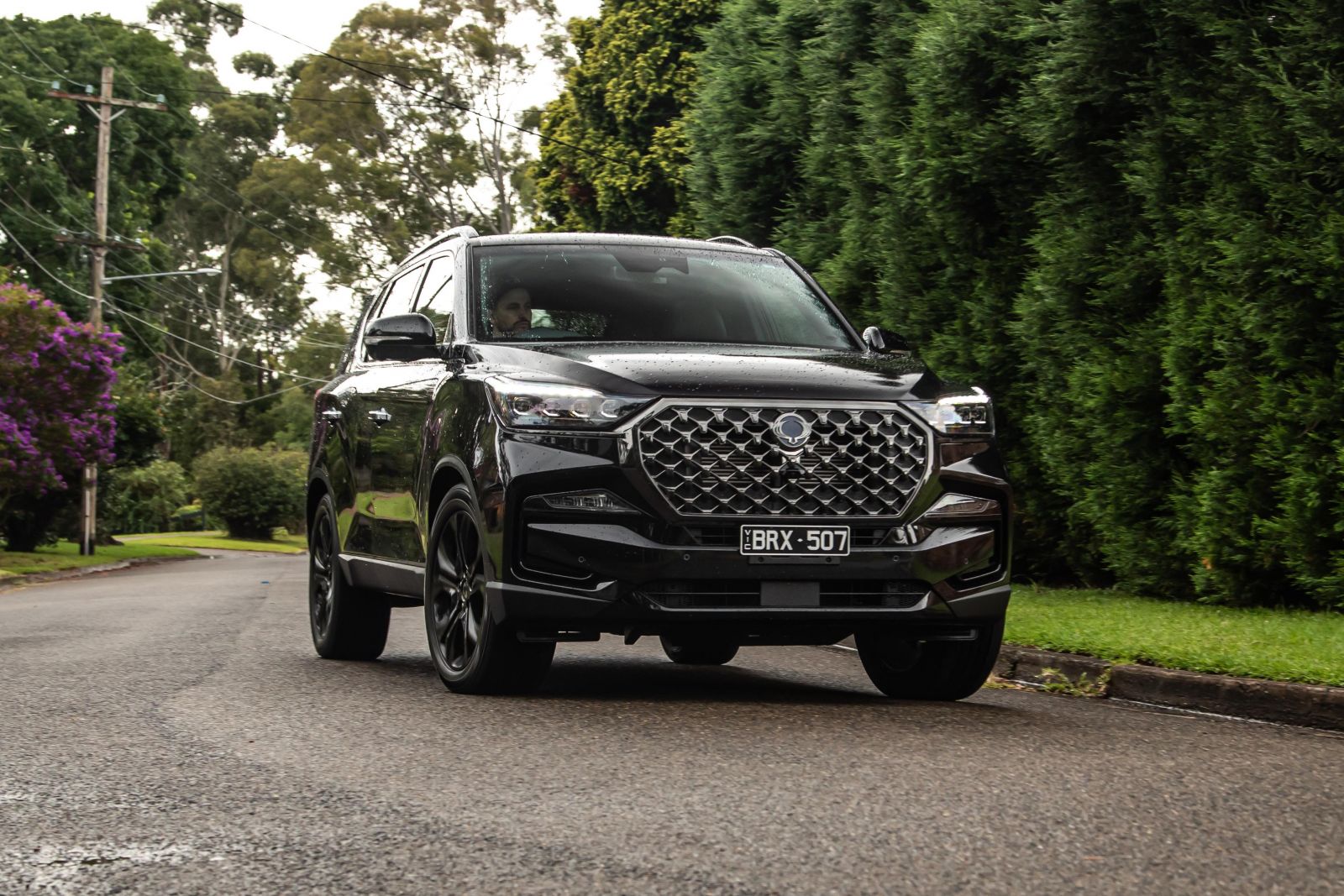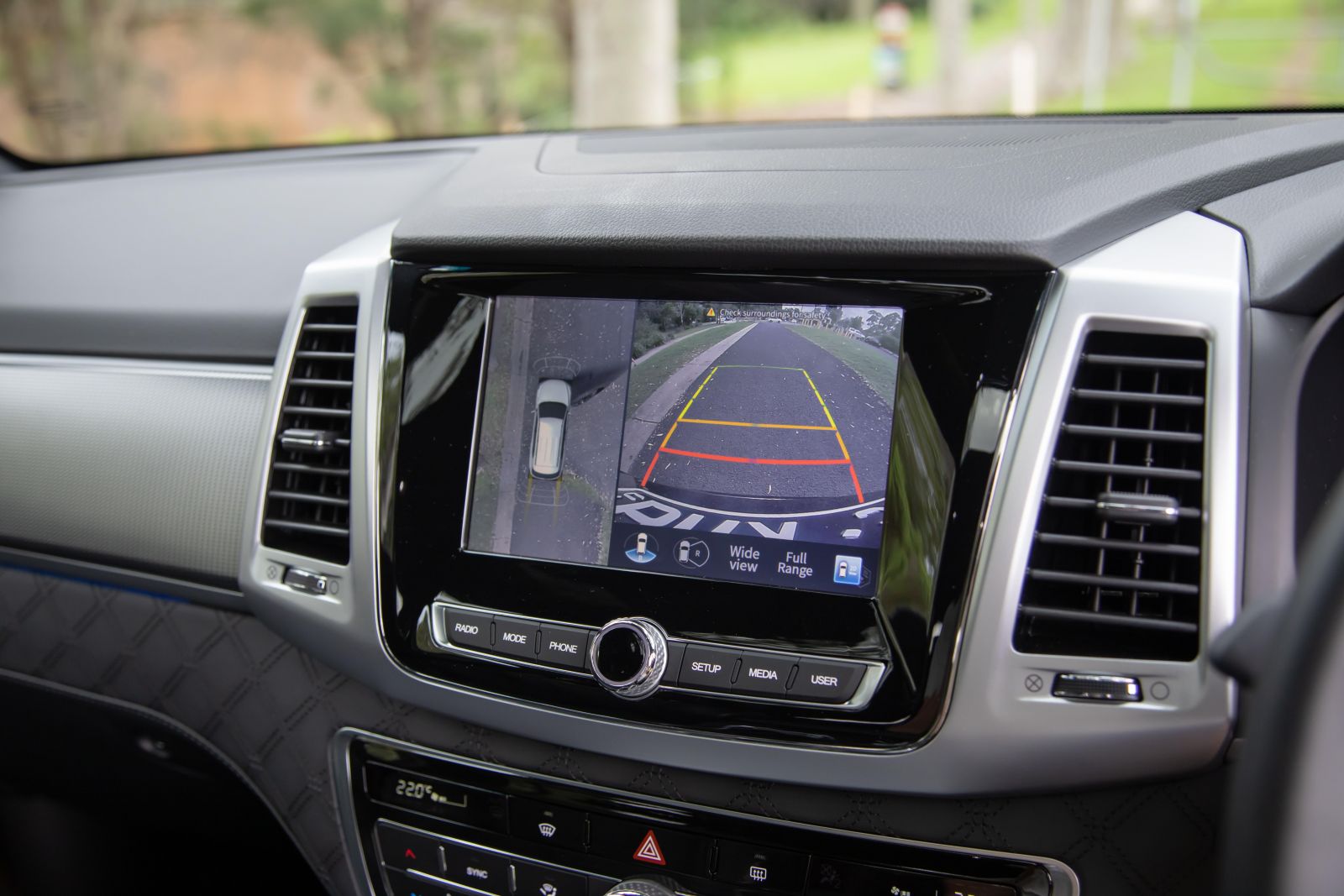This Korean company offers huge value for buyers on a budget.
SsangYong, which is set to soon be rebranded KG Mobility after a long takeover process, has always been considered the ‘other’ South Korean car maker behind Hyundai and Kia.
And in Australia, the company has always hung its hat on value for money as one of the key considerations for customers. In 2023, that is like whispering sweet nothings into the ears of new-car consumers, as prices continue to rise and spec sheets constantly change.
SsangYong isn’t immune to that kind of activity, with the 2023 SsangYong Rexton line now being topped by this model, the Sport Pack. For 2022 it was known as the Black Edition, and this car even has that badge still on it.
But the spec is the same, the value is still huge, and there’s a lot of boxes ticked for buyers who want a seven-seat, diesel-powered, 4×4, automatic, 3.5-tonne-towing-capable SUV that happens to have an outstanding on-paper ownership promise.
Is there a catch? Are there several? Read on to find out.
How much does the Ssangyong Rexton Sport Pack cost?
Prices haven’t changed since 2022, and we have the flagship Sport Pack on test, which lists for $56,585 drive-away.
2023 SsangYong Rexton pricing:
- 2023 SsangYong Rexton ELX: $47,990
- 2023 SsangYong Rexton Ultimate: $54,990
- 2023 SsangYong Rexton Sport Pack: $56,585
Prices are drive-away
Those are drive-away prices applicable nationwide, which is a nice touch from the brand, and helps you dodge the gouging that some dealers might try when it comes to additional fees at purchase time.
I’ll detail the extras you get in the Sport Pack model below, but just know that it is a pretty value-packed wagon for the money.
What are the nearest rivals, then? The obvious choices include the Mitsubishi Pajero Sport, Isuzu MU-X, Toyota Fortuner and Ford Everest, though none come even close to offering what you’re getting in the Rexton for this kind of cash.
What is the Ssangyong Rexton Sport Pack like on the inside?
You don’t feel like you’re sitting in an affordable SUV when you saddle up in the SsangYong Rexton – and that’s a nice change compared to some other cut-price options in the ute-based SUV segment.
The interior of the Rexton makes a Fortuner feel like it was made for the 1990s, and leaves the Pajero Sport looking like a late-2000s laggard.
So much of that comes down to the treatment used in the cabin, which includes stitched material finishes on the doors and dashboard, and quilted nappa leather seat trim that feels properly special for a vehicle like this.
There’s also the recently added 12.3-inch digital instrument cluster, which adds a bit of flair to the cabin. It makes the 8.0-inch touchscreen look a bit underdone, and that screen is, in fact, a bit of a downer. It’s got a weird sheen to the display which means it can be hard to see at times, and the menus aren’t as intuitive as they could be.
But I love that there are buttons and dials for the media controls, not just a simple touchscreen on its own as some other brands offer.
Plus there are more buttons and dials below for the climate control system, and thankfully, there’s not that much piano black used in the cabin, either. It’s better than some rivals for ergonomics, too – though the HUGE steering wheel does make it feel a bit like a bus.
There are heated and cooled front seats, electric seat adjustment for both front seats, and – as you’d find in a high-spec Hyundai, Kia or Genesis – the passenger-side front seat has controls on the inner side of the backrest so you can adjust it for better rear-seat access, if you need to.
There is reasonable storage on offer, including a wireless phone charger with a cover, cup holders between the seats, a centre console bin, glovebox and door pockets with bottle holders, too.
In the second row there is good storage on offer too, with a pair of map pockets, a flip-down armrest with cupholders, bottle holders in the doors, and there are directional air-vents, and a pair of USB ports, too.
Child seat fitment is a second-row-only proposition, with window-seat ISOFIX points and three top-tether points for the middle row. The back row doesn’t have any child-seat fitment options.
Second-row space is good, and I could easily fit behind my own driving position (at 182cm or 6’0”) which can’t be said for some other rugged seven-seaters. Unlike some three-row vehicles, though, the Rexton’s back bench doesn’t slide fore and aft, meaning it does make more sense as a five-seater, because you can’t tailor the space to cater for the capacity.
And, as you’d expect, third-row space is therefore a one-size-won’t-fit-all deal. I managed to clamber in easily enough, but the space with the second-row in its static position was not great. I had extremely limited foot and knee room, and a terribly uncomfortable knees-up position.
I fit, sure. But it’s going to be a better fit for really small occupants, if you dare.
I say that because there is no airbag coverage for the third row. You might be okay with that, but I’d err on the side of “you can take your own kids to soccer”, personally.
If you decide otherwise, there is a set of vents in the back row but they are down above the wheel arch on the driver’s side only, where there is also a fan controller. Ceiling vents are always a better option.
Okay, so what about boot space?
This grade gets a proximity opening and closing tailgate, which is great when you’ve got your hands full. It’s even better when it works. Sometimes it just didn’t seem to recognise the key was close by.
With all three rows up there’s 236 litres of cargo capacity. There’s a false floor section you can put in when you lower the third row, to create a flat load space. In that configuration, the space isis 641 litres – easily enough for a weekend’s worth of luggage and a pram.
As mentioned, I actually reckon this would be a really good option for a family who plans to use the first and second rows primarily, and those third-row seats can be considered bonus spots if needed.
Further, there’s a full-size spare wheel under the body of the car, too.
What’s under the bonnet?
Every Rexton comes with a 2.2-litre turbo-diesel four-cylinder engine, which is what you’d expect for this kind of SUV, but it isn’t necessarily worrying the big boys when it comes to grunt numbers.
Even so, with 149kW of power (3800rpm) and 441Nm of torque (1600-2600rpm), there’s a bit of strength from the single-turbo unit.
It comes standard with an eight-speed auto transmission, and there’s part-time four-wheel drive with low range (so, 2H, 4H and 4L), and it has an auto locking rear diff if you plan to hit the rough stuff.
Towing is taken care of – at least on the specs sheet – with the Rexton boasting the benchmark standard of 750kg unbraked and 3500kg braked towing. The down ball rating is 350kg.
If you’re curious about the weights of this big rig, the kerb weight is stated as 2130kg, while gross vehicle mass (GVM) is 2960kg (so, 830kg payload). The gross combination mass (GCM) for towing folk is 6460kg.
How does the Ssangyong Rexton Sport Pack drive?
Don’t go thinking that the Sport Pack makes it drive much more “sporty” than the regular Rexton. And if you want the best driving 4WD in this class, you need to buy a Ford Everest.
Having said that, I’d prefer to live with this than a Fortuner or Pajero Sport, even if it does have some pretty clear flaws.
The suspension is better sorted than plenty of other ute-derived, body-on-frame vehicles, especially considering it has 20-inch wheels fitted.
It isn’t perfect, but it is entirely liveable, with a pretty comfortable ride and reasonable handling for this type of car. There is some wobble in corners and the back end can bounce a bit over speed humps, but it’s less offensive than the overly hard ride of a Fortuner, for instance.
The high-spec Rexton models have speed-sensitive steering setups, which is good at lower speed as it makes the car more manageable for parking moves, but at higher speeds on sweeping bends it can be a bit odd in its weighting – almost like the steering is fighting you.
The turbo-diesel engine suffers from some low-speed lag, and it is a bit frustrating when you’re taking off from a standstill, and I had a fair few instances at traffic lights where I overestimated the reaction times of the cars ahead, only to have to go through the lag-lurch sequence a few times in succession.
The eight-speed auto is a decent thing, harnessing the diesel engine’s torque and thankfully letting the engine pull instead of shifting to maintain momentum.
But the gear selector – an e-shifter – is a pain. I had issues with it when shifting quickly between drive and reverse or vice versa.
On several occasions I ended up in neutral, and a few times I was in manual mode without wanting to be, too. I’m sure you’d get used to it once you spent more time with it, but even so, it isn’t as intuitive as it could be.
One other thing I noticed was that, typically at speeds around 80km/h, there was a bit of vibrational lurch.
This was not a wheel balance or alignment issue – it felt more like there was an imbalance under the bonnet, and it caught me off-guard the first time it happened.
What do you get?
Here’s a rundown on the gear you get in each spec:
Rexton ELX:
- 18-inch alloy wheels
- LED headlights, front fog lights and daytime running lights
- Automatic high-beam
- 8.0-inch touchscreen infotainment system
- Wired Android Auto and Apple CarPlay
- 12.3-inch digital instrument cluster
- Leatherette upholstery
- Leather-wrapped steering wheel
- Heated and ventilated front seats
- Eight-way power driver’s seat
- Six-way power passenger seat
- Heated second-row outboard seats
- Six-speaker sound system
- Dual-zone climate control
- Tyre pressure monitoring
- Tilt and telescopic steering wheel adjustment
- Keyless start
- Rain-sensing wipers
- Automatic headlights
- Power-folding, heated exterior mirrors
The Ultimate adds:
- Nappa leather upholstery
- Heated leather steering wheel
- Third-row air-conditioning vents and fan controller
- Driver’s seat memory
- Wireless phone charging
- 360-degree surround-view camera
- Sunroof
- Power tailgate (electric boot) with proximity auto opening and closing
- Touch-sensing front door locks with walk-away auto-door locking
- Ambient lighting
- Illuminated front door sill plates
- Rear privacy glass
- Side mirrors with reversing dip view
- Speed-sensitive power steering
- Auto up/down power windows front and rear
The Sport Pack adds:
- Black-finish 20-inch alloy wheels
- Gloss black grille
- Black roof rails
- Black chrome front foglamp trim
- Black chrome tailgate garnish
- Black chrome rear skid plate garnish
It’s fair to say that this is a family SUV with more equipment than most competitors at this price point – though you’ll be the judge on whether the step up through the range is worth the extra cash.
Is the Ssangyong Rexton Sport Pack safe?
The Rexton hasn’t been tested by any safety authority like ANCAP or Euro NCAP, so there’s no way to say whether it’s a safe choice based on independent testing.
I’m not going to crash test it for you, but it has some of the stuff you’d expect in 2023 to make it a safe car, including auto emergency braking system, lane departure warning, blind spot monitoring, rear cross-traffic alert, auto high beam lights, and a system that’ll chime to tell you if the car ahead has moved on.
What it’s missing is active lane keeping tech – which I didn’t really miss. And it also doesn’t have adaptive cruise control, which I did miss.
The base model comes with a reversing camera, and the higher spec models have a surround view system, while all have front and rear parking sensors.
If you plan to use the Rexton as a seven seater a lot of the time, just note that it doesn’t have airbag coverage for the third row seats. It makes a good five seater, though, with side airbags for both front and second-row seats, as well as dual front and driver’s knee airbag coverage.
How much does the Ssangyong Rexton Sport Pack cost to run?
SsangYong has a sweet deal for buyers who want a hassle-free ownership experience – on paper, at least.
The brand offers a seven-year/unlimited kilometre warranty plan, which is as good as you’ll get without having to read the fine print. I did read it, and there’s even an unusual consideration for warranty cover – if you use the vehicle for business, so, as an Uber vehicle, you still qualify for the unlimited mileage cover. Most brands limit it to something like 150,000km.
There’s also seven years’ capped-price servicing, with the rate per visit to the workshop (every 12 months/15,000km) being $375 per visit. That’s cheap for a diesel 4×4 SUV.
And you also get seven years’ roadside assistance included, too. Nice.
As for other running costs, the official combined cycle fuel consumption rating for the Rexton is 8.7 litres per 100 kilometres. If you’re wondering, my average use over the week I drove this SUV was 10.2L/100km, across a mix of urban, highway and freeway testing.
There’s no long-range fuel tank, with the Rexton running a 70-litre capacity.
CarExpert’s Take on the Ssangyong Rexton Sport Pack
The SsangYong Rexton Sport Pack offers a lot of value for money for a buyer who wants exactly that.
It is – like for like – very affordable, and the long warranty and promising (on-paper) ownership program will no doubt be enough to get some buyers through the door, and maybe even over the line.
Click the images for the full gallery
MORE: Everything SsangYong Rexton

